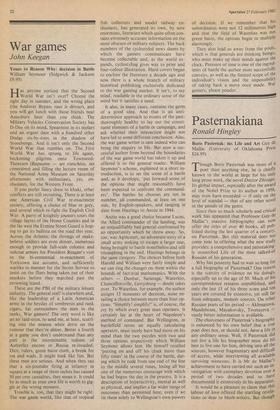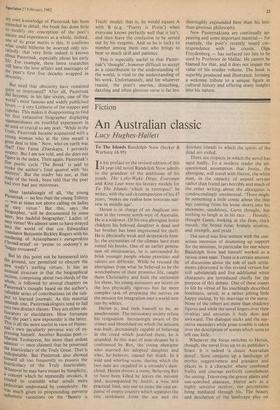Pasternakiana
Ronald Hingley
Though Boris Pasternak was more of a poet than anything else, he is chieflY known to the world at large for his only long prose work, the novel Doctor Zhivago. Its global impact, especially after the award of the Nobel Prize to its author in 1958, may even have exceeded — if only on the level of scandal — that of any other novel in the annals of the genre. Since then so much scholarly and critical work has appeared that Professor Guy de Mallac's massive bibliography can now offer the titles of over 40 books, all pub- lished during the last quarter of a century, on Pasternak. But this material does not come near to offering what the new study provides: a comprehensive and painstaking- ly researched Life of the most talked-of Russian of his generation.
Why has posterity had to wait so long for a full biography of Pasternak? One reason is the scarcity of evidence on his doings, especially up to the age of 50. Much of his correspondence remains unpublished, and only the last 15 of his three score and ten years are covered by extensive, yet still far from adequate, memoir sources. On other Russian poets of his period — Akhmatova, Mandelstam, Mayakovsky, Tsvetayeva vastly better information is available.
The elusiveness ofTasternak's biographY is enhanced by his own belief that a true poet does not, or should not, have a life in any ordinary sense. Well, if Pasternak did not live a life his biographer must do his best to live one for him, delving into all the sources, however fragmentary and difficult of access, while interviewing all available surviving witnesses. It is Mr de Mallac's achievement to have carried out such an in- vestigation with exemplary devotion over a period of two decades and to have documented it extensively in his apparatus.
It would be a pleasure to claim that this labour of love offered the startling revela- tions so dear to blurb-writers. But though
m y own knowledge of Pasternak has been extended in detail, the book has done little to modify my conception of the poet's nature and experiences as a whole. Indeed, one of its great merits is this. It confirms what could hitherto be asserted only ten- tatively: that very little indeed is known about Pasternak, especially about his early life. For example, these latest researches still leave the love affairs and marriages of the poet's first Five decades wrapped in obscurity.
But need that obscurity have remained quite so inspissated? After all, Pasternak did become, in his late sixties, one of the world's most famous and widely publicised lovers — a very Lothario of the steppes and cupolas. This makes it disappointing to find his first exhaustive biographer displaying squeamishness on youthful experiences in an area so crucial to any poet. 'While in the Urals, Pasternak became acquainted with a Young woman who at the time meant a great deal to him.' Now, who on earth was that? One Faina Zbarskaya, I privately suspect. But I am not told, and she does not figure in the index. Then again, Pasternak's rime poetic cycle 'The Break' is said to evoke the author's final quarrel with 'his mistress'. But the reader has not, at that stage of the book, been told that the poet had ever had any mistresses.
Most tantalisingly of all, 'the young Pasternak — no less than the young Tolstoy — was at times not above calling on ladies of easy virtue.' But this, says the b, i°graPher, 'will be documented by some later, less bashful biographer.' Ladies of easY virtue! We almost seem to have strayed into the world of that coy Edwardian translator Benjamin Bickley Rogers with his rendering of Aristophanes's euruproktos (`broad-arsed' or 'prone to sodomy') as baggy-trousered'.
But let this point not be hammered into the ground, nor permitted to obscure the new study's sterling virtues. It has an unusual structure in that the biographical section, comprising about two-thirds of the whole, is followed by several chapters on Pasternak's thought based on the author's valuable series of contributions on the sub- ject to learned journals. As this material into one, Pasternakologists tend to fall n two distinct classes. They are either ob- I ,useators or elucidators. How fortunate that the poet's new expounder is the latter. This is all the more useful in view of Paster- nak's own peculiarly perverse way of ex- pressing himself. Another Russian poet — Marina Tsvetayeva, his more than ardent admirer — once claimed that he possessed the Inarticulacy of the Truly Great. That is Indisputable. But Pasternak also showed himself all too frequently to possess the luarticulacy of the Truly Inarticulate. Whatever he may have meant by Simplicity, a concept which he repeatedly invokes, it tended to resemble what minds more Pedestrian understand by complexity. He was much given to propounding perverse aphoristic variations on the 'Beauty is
Truth' model: that is, he would equate A with B (e.g. 'Poetry is Prose') when everyone knows perfectly well that it isn't, and then leave the confusion to be sorted out by his exegetes. And so he is lucky to number among them one who brings to bear so much skill and patience.
This is especially useful in that Paster- nak's 'thought', however difficult to accept as a contribution to the understanding of the world, is vital to the understanding of his work. Unfortunately, and for whatever reason, the poet's uneven, disturbing, dazzling and often glorious verse is far less thoroughly expounded here than his less- than-glorious philosophy.
New Pasternakiana are continually ap- pearing and some important material — for example, the poet's recently issued cor- respondence with his cousin, Olga Freydenberg — has surfaced too late to be used by Professor de Mallac. He cannot be blamed for that, and it does not impair the value of his erudite volume. The book is superbly produced and illustrated, forming a welcome tribute to a unique figure in cultural history and offering many insights into his nature.





































 Previous page
Previous page